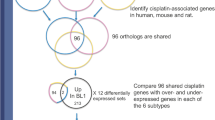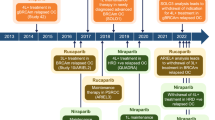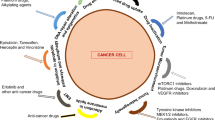Abstract
Purpose
This study was conducted to determine the in vitro optimal combination of selected anticancer agents with gefitinib and evaluate its effect on the expression of correlative biological targets in the cell-signaling pathway. In addition, the effect of gefitinib on the expression of ATP-binding cassette (ABC) transport proteins was evaluated.
Methods
Growth inhibition assays were conducted in five human ovarian cancer cell lines to evaluate the activity of selected anticancer agents in combination with gefitinib compared to each alone. Enzyme linked immunosorbant assay (ELISA) assessed the presence of pEGFR in treated and untreated cells. Expression of correlative biological targets in the cell-signaling pathway was completed by immunoblotting. RT-PCR was used to characterize the expression ABC transport proteins.
Results
This in vitro study confirmed gefitinib did not have significant cytotoxic activity, the combination of gefitinib with other chemotherapy drugs demonstrated improved in vitro cytotoxic activity in platinum sensitive ovarian cancer cell lines. Suppression of pAKT and p-erk activation in cells treated with combination of cisplatin and gefitinib was observed and suggests the role of gefitinib inhibition of proliferative cell signaling pathway.
Conclusion
This data suggests that EGFR-inhibitors, such as gefitinib, have the potential to modulate common mechanisms of drug resistance and may have a role in optimizing chemotherapy regimens for the treatment of ovarian cancer.



Similar content being viewed by others
References
Salzberg M, Thurlimann B, Bonnefois H, Fink D, Rochlitz C, von Moos R, Senn H (2005) Current concepts of treatment in advanced or recurrent ovarian cancer. Oncology 68(4–6):293–298
Kelland LR (2005) Emerging drugs for ovarian cancer. Expert Opin Emerg Drugs 10(2):413–424
Fojo A, Thomas C, Robert C et al (1987) Multi-drug resistance in ovarian cancer. Cancer 60:2075–2080
Baselga J (2002) Why the epidermal growth factor receptor? The rationale for cancer therapy. Oncologist 7(suppl 4):2–8
Cloven NG, Kyshtoobayeva A, Burger RA, Yu IR, Fruehauf JP (2004) In vitro chemoresistance and biomarker profiles are unique for histologic subtypes of epithelial ovarian cancer. Gynecol Oncol 92(1):160–166
Maihle NJ, Baron AT, Barrette BA et al (2002) EGF/ErbB receptor family in ovarian cancer. Cancer Treat Res 107:247–258
Kuppen PJK, Schuitemaker H, van’t Veer LJ, deBruijn EA, van Ossteron AT, Schrier PI (1988) cis-Diaminedichloroplatinum (II)-resistant sublines derived from two human ovarian tumor cell lines. Cancer Res 48:3355–3359
Kawai K, Kamatani N, Georges E, Ling V (1990) Identification of a membrane glycoprotein over expressed in murine lymphoma sub lines resistant to cis-diaminedichloroplatinum (II). J Biol Chem 265:13137–4212
Synold T, Dussalt I, Forman BM (2001) The orphan nuclear receptor SXR coordinately regulates drug metabolism and efflux. Nat Med 7(5):584–590
Smith JA, Brown J, Martin MC, Ramondetta LM, Wolf JK (2004) An in vitro study of the inhibitory activity of gemcitabine and platinum agents in human endometrial carcinoma cell lines. Gynecol Oncol 92:314–319
Albain KS et al (2002) Adjuvant chemohormonal therapy for primary breast cancer should be sequential instead of concurrent: initial results from intergroup trial 0100 (SWOG-8814). Proc Am Soc Clin Oncol 21:37a
Solit DB et al (2003) Pulsatile administration of the EGF receptor inhibitor gefitinib (‘Iressa’ ZD 1839) is significantly more effective than continuous dosing sensitizing tumors to Taxol. Clin Cancer Res 9(Suppl):A83
Herbst RS, Fukuora M, Baselga J (2004) Gefitinib—a novel targeted approach to treating cancer. Nat Rev 4:956–965
Ciardiello F, Caputo R, Bianco R et al (2000) Antitumor effect and potentiation of cytotoxic drugs activity in human cancer cells by ZD-1839 (Iressa), an epidermal growth factor receptor selective tyrosine kinase inhibitor. Clin Cancer Res 6:2053–2063
Finn RS, Beryt M, Pergram MD et al (2002) ZD 1839 (‘Iressa’) acts synergistically with chemotherapy in ovarian cells expressing high levels of the EGFR. Proc Am Soc Clin Oncol 21:29b (A 1928)
Naruse I, Ohmori T, Ao Y, Fukumoto H, Kuroki T, Mori M, Saijo N (2002) Antitumor activity of the selective epidermal growth factor receptor-tyrosine kinase inhibitor (EGFR-TKI) Iressa (ZD1839) in an EGFR-expressing multidrug-resistant cell line in vitro and in vivo. Int J Cancer 98:310–315
Baselga J (2004) Combining the anti-EGFR agent gefitinib with chemotherapy in non-small cell lung cancer: how do we go from INTACT to impact? J Clin Oncol 22:759–761
Nicholson RI, Hutcheson IR, Harper ME, Knowlden JM, Barrow D, McClelland RA, Jones HE, Wakeling AE, Gee JM (2002) Modulation of epidermal growth factor receptor in endocrine-resistant, estrogen-receptro-positive breast cancer. Ann NY Acad Sci 963:104–115
Braun AH, Stark K, Dirsch O, Hilger RA, Seeber S, Vanhoefer U (2005) The epidermal growth factor tryosine kinase inhibitor gefitinib sensitizes colon cancer cells to irinotecan. Anticancer Drugs 16(10):1099–1108
Acknowledgments
This research was funded by the Donna Marie Cimitile- Fotheringham Award for Ovarian Cancer Research/Sprint for Life Development Award.
Author information
Authors and Affiliations
Corresponding author
Rights and permissions
About this article
Cite this article
Smith, J.A., Gaikwad, A., Yu, J. et al. In vitro evaluation of the effects of gefitinib on the modulation of cytotoxic activity of selected anticancer agents in a panel of human ovarian cancer cell lines. Cancer Chemother Pharmacol 62, 51–58 (2008). https://doi.org/10.1007/s00280-007-0572-y
Received:
Accepted:
Published:
Issue Date:
DOI: https://doi.org/10.1007/s00280-007-0572-y




